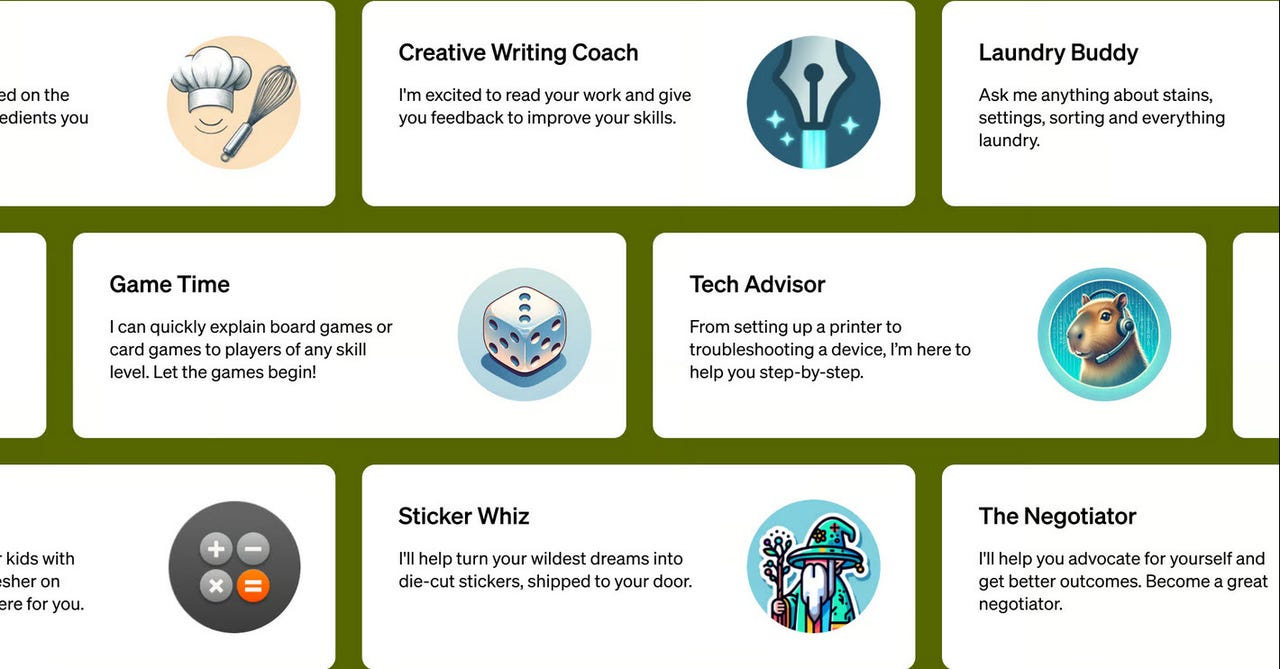ChatGPT subscribers can soon build their own custom chatbots - no coding required


Imagine creating your own ChatGPT chatbot that can handle virtually any task you want. Well, that capability is just around the corner. At its first Dev Day event on Monday, ChatGPT creator OpenAI unveiled a new feature that will let paying subscribers cook up their own custom chatbots known as GPTs.
The idea behind the new GPT model is to help subscribers move beyond the standard ChatGPT model by devising custom models dedicated to more specific areas and tasks. In a new blog post, OpenAI cites a couple of examples: You could create a chatbot focused on teaching computer science in a school or one that lets you design marketing logos and campaigns.
Also: AI is transforming organizations everywhere. How these 6 companies are leading the way
But there's another reason behind the launch of custom GPTs, according to OpenAI.
ChatGPT users have been asking for ways to better customize and control the chatbot and use it in specific areas. Until now, many power users have kept lists of specialized prompts and instructions that they copy and paste into the ChatGPT interface, a process that seems kludgy.
In July, OpenAI rolled out a feature called Custom Instructions to give users more control. But with requests still being received, the company cooked up the idea of custom GPTs.
Subscribers will be able to use their custom GPTs privately, share them publicly, or even roll them out within a company or other organization. Even further, you'll be able to sell ones that have commercial value via a new GPT store that OpenAI plans to open later in November.
Also: The best AI chatbots: ChatGPT and other noteworthy alternatives
OpenAI promises that building the GPTs will require no coding knowledge or skills. You'll be able to concoct one directly through ChatGPT by starting a conversation, providing the instructions, and then selecting what you want your chatbot to do -- search the web, design an image, or analyze data.
You'll also be able to integrate your custom GPTs with external and real-world data through custom actions that act like the plugins currently available with GPT-4. This means you can connect your GPTs to external databases, email inboxes, and even e-commerce systems.
To kick off the process, OpenAI has launched example GPTs, one for the Canva graphic design tool and another for Workflow automation tool Zapier. The company said that it soon plans to offer additional GPTs. For now, you're able to only submit suggested sample requests to the newly launched GPTs. Presumably, full access will soon be available, allowing you to submit any related question or request.
Also: ChatGPT vs. Bing Chat vs. Google Bard: Which is the best AI chatbot?
As with many new and novel ChatGPT features, the ability to use and create custom GPTs is accessible only to ChatGPT Plus and Enterprise subscribers who pay $20 a month for the privilege. Naturally, the goal is to convince more free users who want to try out these features to opt for a paid subscription.
There is also some financial incentive offered by the new GPT program. The GPT store slated to open later this month will allow verified GPT builders to offer their chatbots for sale. People who visit the online store will be able to search for and browse the GPTs that interest them. OpenAI said it will also highlight the most useful GPTs across specific categories. Over the coming months, creators will be able to earn money based on the number of people who use their GPTs.
Though potentially powerful, such custom GPTs lead to some of the same questions and concerns that generative AI itself has triggered. And OpenAI addressed that topic as well.
Also: The ethics of generative AI: How we can harness this powerful technology
"GPTs will continue to get more useful and smarter, and you'll eventually be able to let them take on real tasks in the real world," the company said in its blog post. "In the field of AI, these systems are often discussed as agents. We think it's important to move incrementally towards this future, as it will require careful technical and safety work -- and time for society to adapt. We have been thinking deeply about the societal implications and will have more analysis to share soon."